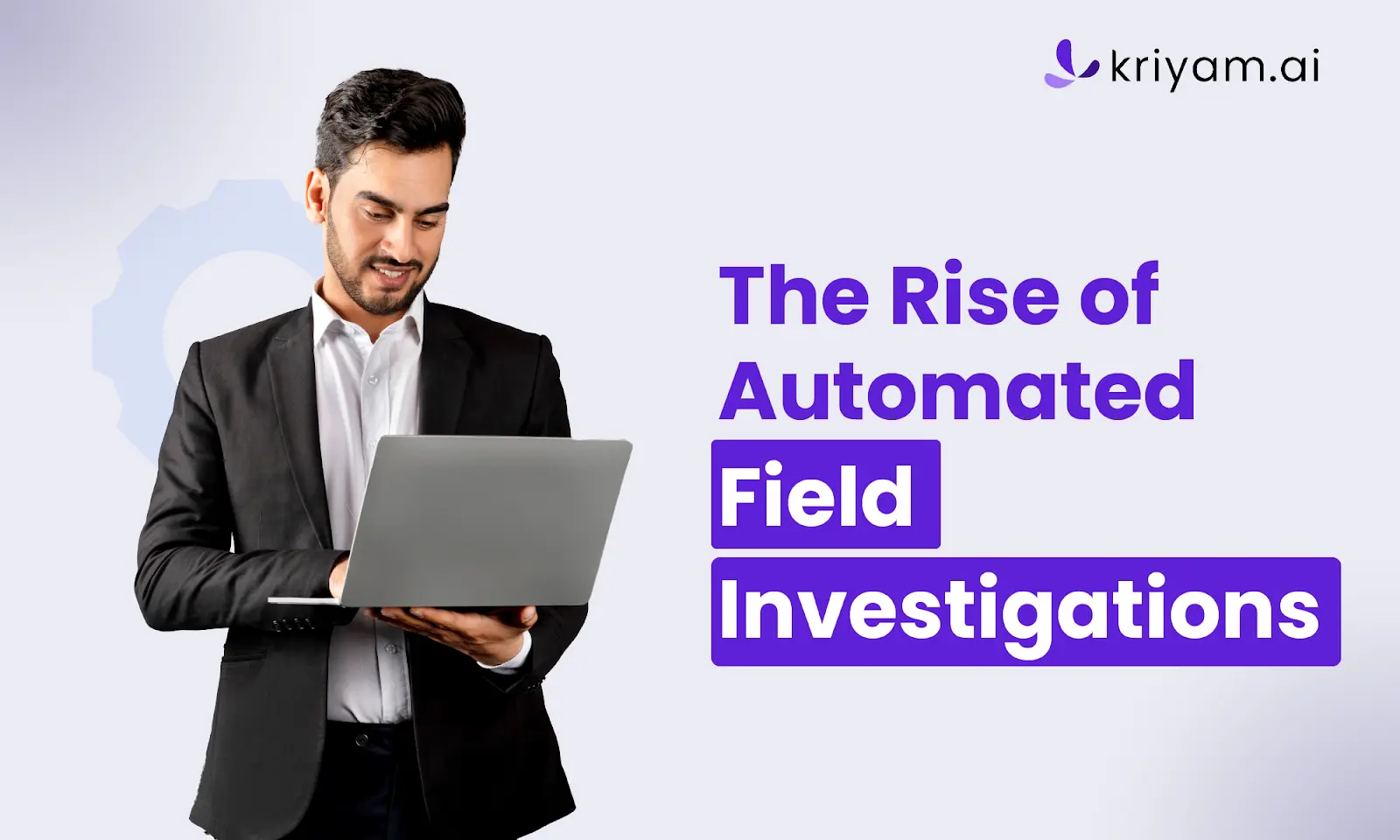The Rise of Automated Field Investigation Software: A Deep Dive
Ajai Prabhu | 5th January, 2024
4 min reads
Ajai Prabhu | 5th January, 2024 | 4 min reads

Beyond Traditional Methods: The Emerging World of Automated Field Investigation Software
Welcome to the Future of Field Investigations in the BFSI Sectors! Have you ever found yourself awestruck by how technology is reshaping industries? Well, brace yourself because we’re exploring the domain where traditional fieldwork meets the Innovative advancements of automation. Yes, we’re talking about the dynamic world of Automated Field Investigations (AFIs)! Imagine a day in the life of an insurance investigator but with a tech-savvy twist. Gone are the days of complicated paperwork and tedious manual processes. Now, enter a world where precision, speed, and accuracy are not just buzzwords but everyday reality. In this blog, we're going to unwrap the layers of how AFIs are not just transforming – but completely reinventing – the BFSI sectors. From laborious to lightning-fast, from error-prone to excellence-driven, the shift is monumental. With Automated Field Investigation Software leading the charge, businesses are witnessing a transformation that's not just about doing things better but doing them differently. It's about taking a giant leap from manual diligence to automated prowess. Let’s get started!
Understanding Automated Field Investigation Software
Automated Field Investigation (AFI) software serves as a digital assistant in fields such as insurance, banking, and finance, enhancing the efficiency and effectiveness of field investigations. It streamlines the process of gathering and analyzing field data. Traditional field investigations, reliant on manual data collection and reporting, are often time-consuming and prone to errors. In contrast, AFIs utilize advanced technology to expedite and enhance the accuracy of these tasks, ensuring more reliable and efficient outcomes in field investigations.
How Does it Work?
Imagine you're an insurance company needing to check if a claim is valid. Traditionally, a person would need to go to the site, take notes, and maybe click pictures. But with AFI, you can use software and tools like cameras and sensors that collect all the information automatically. Automated Field Investigation (AFI) software functions like a round-the-clock, highly efficient detective, collecting data and analyzing it to provide comprehensive reports. This marks a transformative step in field investigation, moving away from traditional methods towards a digital, technology-driven approach that offers greater speed and accuracy in investigative processes.
The Technology Behind AFIs
The technology behind Automated Field Investigations (AFI) includes field force automation software, and encompasses a range of technical tools, systems, and methods designed to automate and enhance field investigation processes. Collectively, these technologies contribute to making AFIs efficient, accurate, and scalable. The integration of field force automation software is a key component in this technology, playing a crucial role in streamlining the collection and analysis of data in the field. Here's a breakdown of the key technologies involved:
Artificial Intelligence (AI) and Machine Learning (ML): AI involves creating algorithms that can analyze and interpret data, make decisions, and learn from outcomes. ML, a subset of AI, enables systems to automatically learn and improve from experience without being explicitly programmed. In AFIs, these are used for tasks like pattern recognition, predictive analytics, and decision-making.
Data Analytics: This involves the process of examining data sets to draw conclusions about the information they contain. Data analytics techniques enable the transformation of raw data into meaningful insights, which are crucial in field investigations for making informed decisions.
Internet of Things (IoT): IoT refers to the network of physical devices, vehicles, home appliances, and other items embedded with sensors, software, and connectivity, which enables these objects to connect and exchange data. In AFIs, IoT devices like sensors and cameras provide real-time, on-site data collection.
Cloud Computing: Cloud technology offers scalable computing resources over the internet. It's vital for storing the vast amount of data generated by AFIs and provides the computational power for processing this data efficiently.
Mobile Technology: Smartphones and tablets are used in AFIs for data collection and communication. Mobile apps can facilitate the direct input of field data into centralized systems.
Geospatial Technology: This includes technologies like GPS (Global Positioning System) and GIS (Geographic Information Systems) used for mapping and spatial analysis. In AFIs, they help track locations and visualize data geographically.
Blockchain: Known for its security features, blockchain technology can be used in AFIs to ensure data integrity and security. It creates a tamper-proof, decentralized record of transactions, which is crucial in maintaining the credibility of data collected in the field.
Robotic Process Automation (RPA): RPA is used to automate routine, rule-based digital tasks like data entry, which reduces manual errors and increases efficiency. These technologies make Automated Field Investigations better and more accurate at collecting and understanding data, doing a better job than older methods. Benefits of Automated Field Investigation software

Enhanced Efficiency and Speed
Automated Field Investigation (AFI) software, particularly when integrated with field service manager software, greatly improves the efficiency and speed of fieldwork. This is essential in time-sensitive sectors such as insurance, where rapid decision-making can significantly impact outcomes.
Accuracy and Reliability
The precision of AFI systems plays a crucial role in reducing errors. This accuracy ensures that the results and insights provided are reliable and trustworthy, which is vital for making informed decisions based on the data collected.
Cost-Effectiveness in the Long Run
While the initial investment in AFI software might be higher due to setup and integration costs, these systems prove to be cost-effective over time. They reduce the need for extensive manual labor, thereby cutting down on long-term operational costs.
Data Processing and Insight Extraction
AFI systems are adept at handling and processing large volumes of data, a task that is incredibly challenging and time-consuming to perform manually. These systems can extract critical insights from the data, which might otherwise go unnoticed.
Scalability
One of the significant advantages of AFI software is its scalability. As a business grows, these systems can adapt and scale accordingly without a substantial increase in resources or costs. This makes them an ideal investment for businesses planning for long-term growth and expansion.
Overall Business Enhancement
Automated Field Investigations, enhance efficiency, ensure accuracy, offer cost-effectiveness, handle large-scale data processing, and provide scalability.
These benefits make AFI software an invaluable tool across various industries, especially those where field investigation plays a critical role.
Applications Across BFSI Industries

Applications Across BFSI Industries refers to the different ways that AFIs are used within the Banking, Financial Services, and Insurance sectors. This indicates that the technology and methods of AFIs are not limited to a single area but are instead versatile and beneficial across a broad range of businesses and services within these industries. How Automated Field Investigations Help in Banking, Financial Services, and Insurance:
1. In Banking:
Stopping Fraud: Banks use these systems to look at how customers use their accounts. For example, if someone suddenly starts spending a lot of money, the system flags this as unusual and checks for fraud.
Checking Credit for Loans: These systems quickly gather information like a person's credit score, job, and how they spend money to decide if they can be given a loan. Following Rules: Banks use automated tools to make sure they are following laws, like those that stop money laundering, by keeping an eye on any suspicious activities.
2. In Financial Services:
Helping with Investments: Investment companies might use these tools to look at market trends and how stocks are doing. This helps them give good advice to their clients.
Understanding Risks: To figure out how risky an investment might be, these systems can look at things like how the market is doing and how investments have done in the past.
Checking Client Backgrounds: These systems are really fast at confirming who clients are and making sure they meet all legal requirements, which is very important for financial companies.
3. In Insurance:
In the insurance sector, field force automation for insurance agencies revolutionizes several key processes.
Processing Claims: For example, in car insurance, these tools can look at photos from accidents and police reports to quickly decide if a claim is valid and how much it should be.
Assessing Damage: In cases like property insurance, drones with cameras can check areas hit by natural disasters. They send back pictures for fast review, speeding up insurance claims.
Setting Insurance Prices: These systems collect and check information about a person's health and lifestyle to help decide how much they should pay for insurance.
These automated systems help banks, financial firms, and insurance companies work more efficiently. They lead to smarter decisions, better customer service, and compliance with regulations, enhancing efficiency and customer trust.
Learn more - benefits of Field Service Management Software
Future Trends
 The future of Automated Field Investigations (AFIs) is set to be highly dynamic and innovative, driven by a few key trends:
The future of Automated Field Investigations (AFIs) is set to be highly dynamic and innovative, driven by a few key trends:
Advanced AI and Machine Learning: Artificial Intelligence and Machine Learning will become more sophisticated, making AFIs smarter and more capable of analyzing data quickly and accurately. This means that these systems will not only collect information but also understand and interpret it on the spot.
Greater Autonomy in Robotics: Robots and drones used in AFIs are expected to become more autonomous and capable of performing complex tasks with less human input. This will be particularly useful for exploring and monitoring difficult or dangerous environments.
Integration with Internet of Things (IoT): AFIs will increasingly be connected with the Internet of Things, creating a vast network of devices that can collect and share data in real-time. This integration will enhance monitoring and investigative capabilities across various sectors.
Enhanced Sensor Technologies: The development of better sensors will allow AFIs to gather more detailed and accurate data. This could range from high-resolution images to sophisticated environmental measurements, improving the quality of field investigations.
Focus on Ethics and Security: As AFIs become more common, there will be a stronger focus on using them responsibly, especially regarding privacy, data security, and ethical considerations. Ensuring the security of the collected data against cyber threats will also be a priority.
Specialization for Different Sectors: AFIs will be more tailored to meet the specific needs of different industries. This customization means that the tools and techniques used in agriculture, for example, might be quite different from those used in environmental science or archaeology. The future of Automated Field Investigations will see smarter, more autonomous systems with a focus on ethical use, data security, and industry-specific solutions.
Kriyam.ai: A Leading Force in Automated Field Investigation
Kriyam.ai is an innovative platform designed to change the way field investigations are done, especially in the Banking, Financial Services, and Insurance (BFSI) sectors. It's more than just regular investigation software. Kriyam.ai uses advanced AI to improve data security, make operations smoother, and help people make better decisions. This makes it a unique and powerful tool for these industries.
Key features
- Paperless investigations
- Comprehensive case management
- Real-time monitoring
- Agent management
- AI-Powered insights
- Advanced automation tools

Conclusion
To sum it all up, automated field investigation software is changing the game. They make things quicker and smarter, using cool tech like AI and robots. We've seen how they make fewer mistakes and save money in the long run. It's not just about doing things the old way, but better; it’s about doing them in a whole new way. So, what's next? keep learning about this tech, think about using it in your work, and get ready for some exciting changes. Remember, it's all about being smart, fast, and ahead of the game. So, let's step forward with enthusiasm and be part of this exciting evolution!
About the author
Ajai Prabhu
Director- CBO
Ajai Prabhu | Director- CBO
With over a decade of experience in technology and sales, he is an expert in sales growth, building strong customer relationships. He shares insights on driving innovation and scaling tech solutions.
Interests: Tech Innovation, Sales Strategy, Customer Success
Content Overview
Share
FEATURED
Automation
Top 5 Best Field Service Management Software in 2025
Best Field Service Management Software
Shreyas R
27th November, 2023



